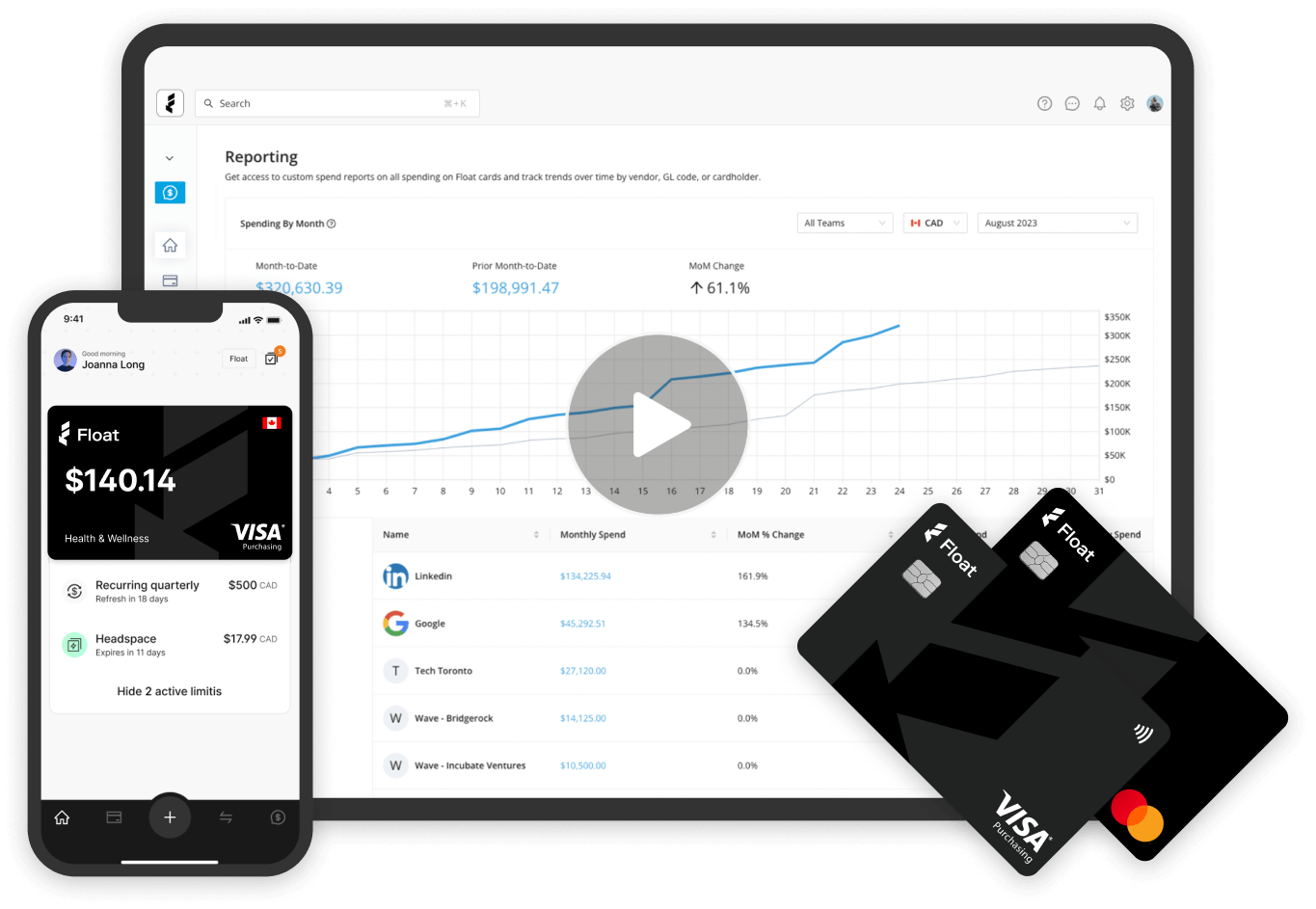Expense Management
Managing Travel Expenses for Growing Companies
Learn how to streamline manual work and empower your teams with a solid travel expense management process.
December 9, 2025

Business travel is surging again—and with many employees still working remotely, managing travel expenses has never been more complicated.
Chasing down travel receipts, untangling expense reports and manually reconciling scattered spending can turn a simple trip into a full-blown admin project. A better expense management process cuts the chaos. It reduces manual work and makes travel easier for everyone from employees to finance.
In this guide, we’ll break down how to take control of your travel expenses with insights from Sophie Dillon at Orbit Accountants, whose clients recently overhauled their process using Float.
Managing travel expenses with a hybrid or fully remote team
For teams that are hybrid or fully remote, companies need two core elements for effective travel expense management:
- A clear travel expense policy outlining what’s covered, what’s not and how reimbursement works.
- A simple, user-friendly system where employees can submit expenses without friction or delays.
Without this foundation, things can get complicated. Dillon explains that, before Float, her clients dealt with endless receipt-chasing and manual tracking. They were also reluctant to spend out of pocket. For distributed teams, these issues compound quickly—especially when employees are submitting travel expenses from different cities and time zones.
“It’s really important to put processes in place to save time and administrative effort. Integrating our clients’ existing accounting tools with Float enabled them to make the reimbursement process seamless. With increased employee travel, all of this becomes essential,” she says.
Float’s Prepaid cards start at a $0 balance until funds are added, reducing risk during travel. Charge cards draw from your approved limit and include the same real-time controls and spend policies.
Building a strong foundation with clear policies
A clear business travel expense policy sets expectations up front. It should outline exactly what expenses are covered, the limits attached to them and how employees are reimbursed, giving them the confidence to spend responsibly and making day-to-day travel spending far easier to handle. It helps your team spend with clarity and avoids surprises for finance.
Reimbursable expenses typically include:
- Hotels
- Transportation (flights, taxis and Ubers, rental cars, mileage on a personal car)
- Daily meal per diem
- Office or development-related costs
Be sure to define your approval chain. “Having department-level approvals eases pressure on the finance department,” says Dillon. “Clearly state spending limits on daily meals, alcohol and who qualifies as a business guest at a meal to avoid any confusion.”
Corporate credit card guidelines are also key to managing travel expenses—but they need to come with clear rules. This consistency matters even more for distributed teams who book travel independently. Decide who gets a card, what it can be used for and what the consequences are when rules aren’t followed.
“When you’re transitioning from out-of-pocket expenses to corporate cards, start with low limits to make sure the team is playing by the rules,” Dillon says. “Once people get used to the process, you can increase the budgets.”
Travel expense policy template for Canadian businesses
Need a travel expense policy template but don’t have the time to create your own? Use the template below to help. You can copy and paste the sections directly into your internal documents, then fill in the blanks based on your own policy. You can also add or remove sections based on your business’s needs.
1. Policy Purpose
This travel expense policy outlines how employees should book, pay for and submit travel-related expenses. It creates consistency, keeps costs in check and keeps reimbursements moving quickly.
2. Eligible Expenses
The company reimburses:
- Airfare/train travel: ____________________________________
- Hotels or accommodation: __________________________________
- Local transportation (rideshare, taxi, rental car): __________________________
- Mileage rate (if using personal vehicle): _________ per km
- Daily meal per diem: __________ per day
- Internet or mobile data for business: ____________________________
- [Insert other eligible expenses]: _______________________________________
3. Non-Reimbursable Expenses
The company will not reimburse:
- Seat upgrades or luxury add-ons
- Personal entertainment or leisure
- Alcohol beyond approved limits
- Late fees or penalties
- [Insert other non-reimbursable expenses]: ______________________________
4. Approvals & Spending Limits
- Travel approved by: _________________________________________
- Per-trip limit: ______________________________________________
- Exceptions approved by: _____________________________________
- Remote employees must follow the digital approval workflow: Yes / No
5. Corporate Card Use (eg. Float)
If provided with a (Float) corporate card, employees must follow these rules:
- Card starts at $0 until funded
- Spending limit: ____________________________________________________
- Merchant restrictions: _______________________________________
- Receipts uploaded via app prompt within: _____________hours
- Cardholder agreement signed: Yes / No
6. Travel Booking Requirements
- Preferred platform: _____________________________________
- Partner integrations used: Yes / No
- Automatic receipt matching (via email forwarding or app): Yes / No
7. Canadian Tax Requirements
Employees need to include the correct tax components on receipts:
GST: ______% | HST: ______% | PST: ______% | QST: ______%
Float automatically supports multi-tax components.
8. Reimbursement Process
- Claims submitted within: _________________ days
- Reimbursements issued via: _________________________________
- Required documentation (check all):
- Itemized receipts
- Proof of payment
- Business purpose statement
- Approval confirmation
9. Policy Violations
- Non-reimbursed expenses
- Temporary suspension of card privileges
- Internal review or disciplinary action
10. Acknowledgment
Employee Name: ________________________________________
Signature: _____________________________________
Date: ____________________
How to handle international business travel expenses
International travel isn’t much different from domestic. You still need clear rules and good documentation, just with a few extra steps.
Clarify which international expenses are eligible, including flights, accommodations, local transportation and meals. Try to provide limits on each expense category by major city, so employees have geo-specific guidelines to work with. This includes per-diem limits and approval rules, so employees know exactly what they can book and spend on before leaving the country.
If employees are using corporate cards, be specific about currency exchange and which cards should be used depending on the country of travel (eg. use USD corporate cards only when travelling to the US to avoid unnecessary fx conversion fees). If employees pay out of pocket, spell out when they should submit claims and what they need to include.
Employees travelling internationally should follow the same approval steps used for domestic trips. Using the same steps across all trips avoids confusion.
How to empower teams with the right tools
Some teams still rely on spreadsheets for travel spend, but that’s where mistakes creep in and savings slip away. Float’s expense management tools are built for teams who travel frequently, giving employees a way to pay for hotels, flights and rideshares without using personal cards. Meanwhile, finance departments get real-time insight into every transaction. With modern tools, your team can:
- Snap receipts on the go
- Submit expenses with a few taps
- Set corporate card controls and spending limits
- Enforce policy automatically
Float also offers up to 1% cashback on eligible CAD and USD card spend, plus 3% base interest on all CAD and USD balances—scaling up to 4% based on monthly Float Card spend. Built-in accounting integrations support fast, accurate reconciliation, and Canadian tax handling with bilingual support simplifies operations for teams working across provinces.
“Float offers real-time visibility, prepaid cards and an easy approval system that even works from a phone,” Dillon says. “There are no more paper trails required to maintain travel expenses, and there’s no more financial guesswork.”
If employees forward receipts to Float or upload them via mobile, they are automatically matched to the correct transaction using OCR, making travel documentation far easier to manage.
Pro tip: Customize limits based on role, responsibility and travel frequency. For example, your road warrior in sales may need a higher limit than your team lead who travels once a quarter.
Float helps you better manage your business spend
See how with your personalized
demo from a Float expert.
Set up mobile expense management for travelling teams
Most travel spend happens in transit, not behind a desk. A mobile-first workflow helps employees stick to the rules without thinking about it, avoid delays and submit accurate information while details are still fresh.
With Float, employees can manage the full expense lifecycle from their phone—reviewing card balances, confirming what’s approved and checking spending rules before making a purchase. This reduces back-and-forth with finance during tight travel schedules.
Instead of waiting until later, employees can save the information finance needs right away, keeping submissions clean and complete. Approvers can also review and respond to requests without waiting for desktop access, keeping travel plans moving.
A mobile workflow brings order to travel spending and helps everyone follow the policy naturally, even when they’re moving fast.
Provide regular staff training
Set your team up for success with a proper onboarding session. This is especially important for remote employees, who depend on clear digital training to stay aligned on travel expectations. Explain your policy, show them how to use the tools and create a space for feedback or questions.
Review policies regularly to keep them relevant as your business grows. Needs evolve—and your policy should too.
Monitor for compliance and efficiency
Once your travel expense management system is in place, don’t set it and forget it. Live oversight keeps finance connected to in-progress travel spend, even when employees are spread across different regions. Review travel spending often, look for unusual patterns and catch issues early.
Automated checks and digital approvals help teams stay aligned and catch issues early.
“Approval documentation is now a built-in part of our clients’ processes,” Dillon says. “It gives visibility to top management and department heads as to where funds are being spent. This has improved budget management.”
Travel expense automation vs. manual processes: what’s better for business travel?
A major driver for businesses wanting to change or upgrade their business travel expenses? The amount of manual processes they currently work with.
Manual processes can slow things down, especially when expense details land all at once after a trip. When employees rely on spreadsheets, paper receipts or end-of-trip reporting, finance doesn’t get the information they need until long after a trip ends, making it harder to track budgets or resolve issues.
Automation fixes that delay by pulling in transactions the moment they happen—and blocking non-approved spend before that happens. Systems like Float categorize expenses, apply policy rules and route approvals as soon as a transaction occurs. This reduces admin work and ensures every travel purchase follows the same standards, regardless of where employees are travelling.
Because Float pulls transaction details directly from corporate cards and syncs them into accounting tools, documentation stays linked to each expense without the extra effort. Finance teams can view spending in a structured way, catch irregularities early and close faster at month-end.
Automation turns scattered steps into one clear, consistent workflow, easing pressure on finance and giving employees a smoother travel experience.
Ready to spend smarter?
Building a strong expense policy, equipping your team with the right tools and keeping a sharp eye on compliance aren’t just best practices—they’re must-haves if you’re serious about managing travel expenses.
When your policies are clear, your team is empowered and your tracking is tight, travel expenses become a well-oiled part of your operations. And with more teams distributed across the country, a unified travel expense workflow keeps things consistent no matter where employees work or travel from.
If you’re still chasing receipts or juggling expense reports, it’s time to give your processes a first-class upgrade. Want your ticket to smarter, faster and more transparent business spending? Book a demo today.
Written by
All the resources

Cash Flow Optimization
ACH vs EFT Payments: Key Differences for Canadian Companies
Learn the key differences between EFT and ACH payments, how they work, which options might be available to your business
Read More
Corporate Cards
Xero Integration for Corporate Cards: Modern Accounting Software Guide
Using Xero becomes more powerful the second you integrate it with your corporate cards. Here's what you need to know.
Read More
Float News
Float 2025: Year in Review
How Float is building the financial system Canadian businesses run on
Read More




